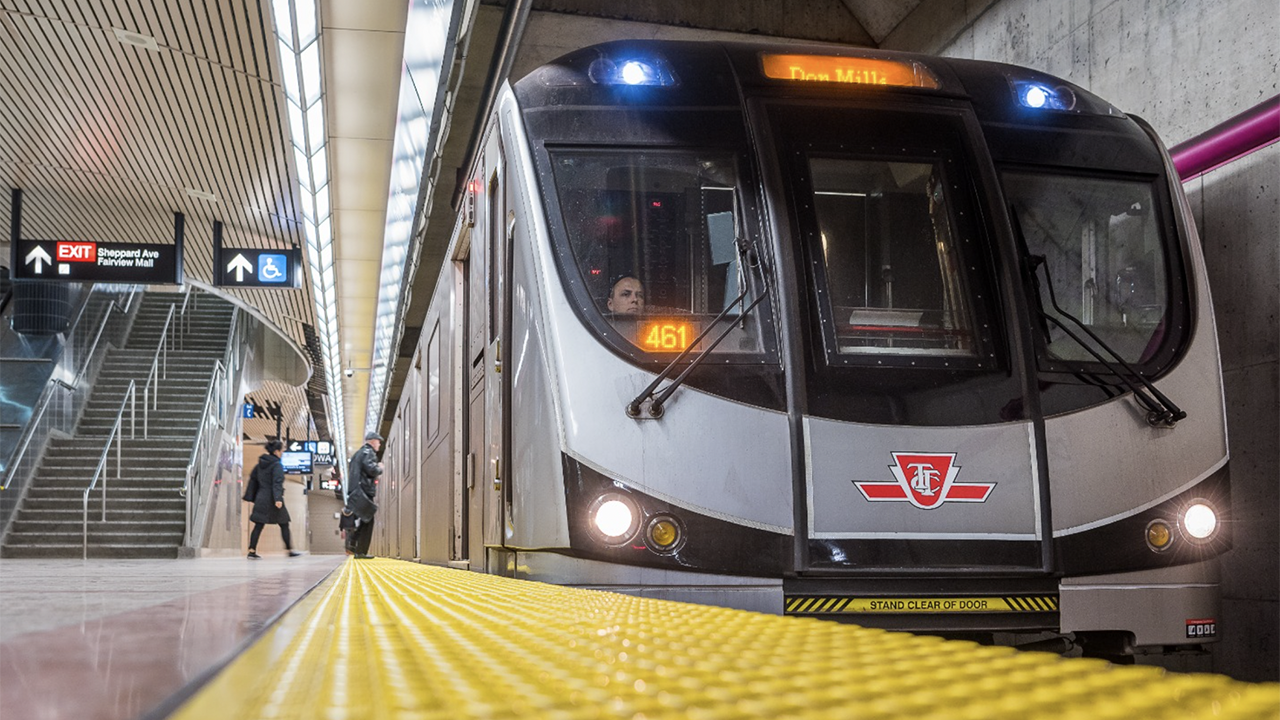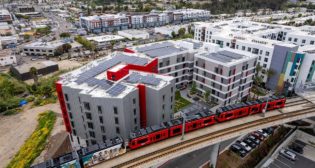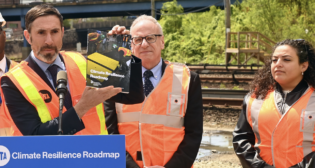
Ontario, Toronto Forge ‘New Deal’
Written by Marybeth Luczak, Executive Editor
The city of Toronto will receive funding from the government of Ontario for 70 Toronto Transit Commission (TTC) subway trains. Fifty-five will be purchased for Line 2 and 15 for the Scarborough Subway Extension and Yonge North Subway Extension projects. (TTC Photograph)
Under a “new deal” reached Nov. 27, the government of Ontario will provide the city of Toronto with up to C$1.2 billion in provincial operating support over three years and capital relief, which includes funding for the Eglinton Crosstown and the Finch West Light Rail Transit (LRT) projects; 70 new Toronto Transit Commission (TTC) subway trains; and subway and transit safety, recovery and sustainability.
Ontario and Toronto reported that the deal follows 10 weeks of “productive working group discussions to find collaborative solutions to the city’s operating and capital deficits” and will help the city “achieve long-term financial stability and sustainability.”
Ontario has agreed to provide Toronto with:
- Annual operating funding of C$330 million over three years beginning in 2024-25 for new subway-integrated provincial transit projects: Metrolinx’s Eglinton Crosstown and Finch West LRT projects.
- More than C$750 million in funding for 55 new subway trains for the TTC’s Line 2, which the government and city said is conditional on matching federal support. “To maximize this procurement opportunity,” they added, Metrolinx would purchase 15 additional trains for two priority transit projects: the Scarborough Subway Extension and Yonge North Subway Extension.
- C$300 million in one-time funding for subways and transit safety, recovery and sustainability, which includes commitments on the part of the city related to increased police or safety officer presence on and near transit, continued expansion of transit rider cellular and data services across the TTC network, and improved emergency reporting options and response timelines for riders.
- C$600 million in additional operating support for shelters and homelessness, which the government and city said is conditional on federal support for refugee and asylum claimants.

Additionally, Ontario will identify provincially owned lands in Toronto that can be used to build homes; upload control of both the Gardiner Expressway and the Don Valley Parkway from Toronto, “subject to third-party due diligence,” to ensure “the long-term protection, preservation and enhancement of these vital assets from the risk of disrepair”; continue discussions “on the longer-term sustainability of Toronto’s finances and operations through the Toronto-Ontario targeted review, with terms of reference established by 2025.”
Toronto has also agreed to the following terms:
- “Meeting or exceeding the province’s housing targets and, as part of that work, identifying and making available surplus city lands for building homes and increase density near transit through the use of tools such as official plans.”
- “Taking further actions to find efficiencies in service delivery and procurement by improving and digitizing processes as well as exploring shared services.”
- “Advanc[ing] the delivery of the Priority Transit Projects and support[ing] key transportation objectives. This includes maintaining commitments to existing agreements; finalizing negotiations on the Subway Program Agreement-in-Principle within defined timelines; accelerating and streamlining city-led approvals to advance planning and construction; committing to get traffic moving to reduce gridlock across the city by working with the province and Metrolinx to manage construction schedules; committing to advance Ontario’s One Fare program; and implementing regional service integration based on provincial direction and city and TTC support. This includes ensuring Toronto is reimbursed for 100% of eligible trips.”
- “Advancing Transit-Oriented Communities by prioritizing approvals and finalization of agreements for the development of East Harbor; and cooperation and collaboration from the city on a proposal for mixed-use Transit-Oriented Communities at the future Woodbine GO [commuter rail] Station.”
According to the government and city, the city also “accepts that the province has the authority to advance project approvals for Ontario Place and intends to do so imminently. The province has also agreed to explore relocating the parking structure to the Exhibition Place grounds to improve public access to the shoreline and to discuss partnership opportunities with the city for maintaining public, community-oriented science programming at the legacy Ontario Science Center.”
To move forward on this new deal, the government said it will soon introduce the New Deal for Toronto Act, which, if passed, “would provide the necessary authorities to make this deal a reality.”
The government and city said that while they “have taken meaningful action through this new deal to advance key provincial priorities, federal assistance is essential for the city to achieve long-term financial sustainability.” They said they “continue to call on the federal government to step up as a full partner with funding in critical areas of need such as shelter support for asylum claimants and transit funding.”
“This historic new deal will help support the future growth of Toronto, delivering shared priorities like building homes, public transit and infrastructure,” said Doug Ford, Premier of Ontario. “Toronto is critical to Ontario and Canada’s economic success, and we need all levels of government working together to deliver solutions that protect services and put the city on a path towards long-term financial sustainability. When Toronto succeeds, Ontario and Canada succeed.”
“This new deal means unlocking Toronto’s potential,” Toronto Mayor Olivia Chow said. “It means the city has billions more for affordable housing; fixing our aging transit system; and building complete communities with child care, community centers, parks, and more. When all orders of government work together on shared priorities, we can deliver more for the people of Toronto.”



